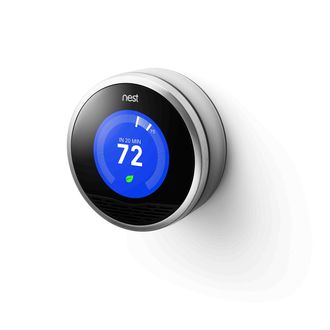
Google just made the biggest tech news of 2014 so far by buying Nest Labs, a four-year-old company that makes smart thermostats and smoke detectors, for $3.2 billion in cash. That’s a big number — more than three times what Google paid for navigation app Waze last year, but less than it reportedly offered for Snapchat — and it raises a whole bunch of questions about what, exactly, Google wants with a home appliance company.
First things first: Nest isn’t just any widget-maker. It was started by Tony Fadell, an ex-Apple executive who led the team that created the original iPod, and its devices are among the first mass market home appliances to be Internet-connected. And those two things are among the reasons Google might have been willing to shell out. Some other points to consider:
– Nest is billed as a thermostat and smoke detector company, but it’s really in the data-collection business. Once Nest’s sensor-equipped devices are in a user’s home, they can pick up all kinds of information — when people enter and leave, when lights are turned on and off, how patterns of energy use change throughout the day — and use that information in various ways. Google has long been interested in this kind of data collection and use — in 2011, it shut down a pilot project called PowerMeter that tracked energy use in the home and suggested ways to be more ecofriendly. But it never had its own proprietary devices to put in people’s homes. Now it does.
– Smart thermostats are only being used in one percent of U.S. homes, but they — and other smart devices — are going to be a huge trend in computing in the coming years. The “Internet of Things,” as this whole genre of Internet-connected appliances is called, is growing up, and Nest is one of the bigger companies making devices for it. Google is clearly interested in this stuff — last year, they released a Nest app for Google Glass that allowed wearers to set temperature using voice commands — and Nest also has ambitions beyond just controlling the temperature in your house. In a Q&A with the New York Times last year, Fadell discussed what he sees as the future of the Internet of Things:
Every time I turn on the TV, that’s information that someone is home. When the refrigerator door opens, that’s another sensor, more information. Before, it was about one little brain and one little sensor, very tightly programmed. Now we have disparate things with an interconnection network, a brain that can evolve and sensor networks that can evolve, all interacting with these learning patterns.
Google agrees, and it wants to be that interconnection network. Buying Nest was a good way to get a head-start.
– This deal will probably freak out more than a few privacy worrywarts. Now Google will eventually have an inroad not just into your phone, your computers, your commute (through self-driving cars), your finances (if you use Google Wallet), but your physical home. In a decade, even locking yourself in your basement won’t get you out of reach of Google’s data vacuum.
– This is bad news for SmartThings, the Internet of Things platform I wrote about last year. I liked SmartThings and respected its ambitions of becoming the operating system for the home, but the one thing that always seemed dangerous about it was the risk that a web giant would build something similar and muscle them out of the market. Now their biggest opponent is Google — never a good thing.





























